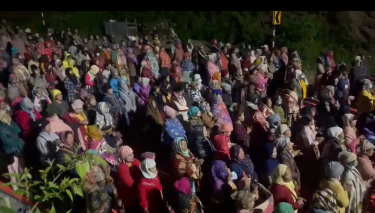
In a significant development, the Manipur government has extended the Armed Forces (Special Powers) Act (AFSPA) for another six months, effective from 1 October 2024. This decision, announced on 30 September, applies to most of the state, excluding 19 police station areas primarily in the Imphal valley and regions bordering Assam.
The extension of AFSPA, which grants special powers to the armed forces in “disturbed areas”, comes in response to continued ethnic-religious violence and insurgent activities. The state government cited the complex security situation, stating it was “not expedient to have a detailed assessment on the ground as security agencies are preoccupied with maintenance of law and order”.
This move follows a series of violent incidents and tensions that have plagued the northeastern state for over a year. Most recently, on 28 September, fresh violence erupted in Manipur's Jiribam district. Police reported an exchange of gunfire at Mongbung Meitei village, which began around 11:30 am and continued until 2 pm. While no casualties were reported, the incident prompted the evacuation of women, children, and elderly residents to safer locations.
The ongoing unrest has its roots in the ethnic-religious conflict between the Hindu Meitei and Christian Kuki communities, which mainly revolves around competition for land and jobs. Since May 2023, more than 200 people have been killed, with nearly 70000 displaced due to the violence.
Amidst this turmoil, controversial incidents continue to fuel tensions. On 27 September, a transgender activist, Malem Thongam, gave a 10-day ultimatum to Chief Minister N Biren Singh, demanding the removal of 10 Christian lawmakers from the Kuki-Zo tribal community. Thongam threatened self-immolation if the demand was not met, a move that a local Church leader described as “an attempt to divert attention” from other pressing issues.
The situation has been further complicated by allegations of militant infiltration. On 26 September, the Manipur government issued a clarification regarding claims of Kuki militants planning an attack on Meitei people. The government stated that while information about infiltration had been received and investigated, “the verification process did not reveal any concrete evidence to substantiate these claims”. This retraction came after widespread alarm and a four-day travel advisory issued by the Indigenous Tribal Leaders' Forum (ITLF) for Kuki-Zo tribal people.
On 26 September, threats were reported against Babloo Loitongbam, executive director of Human Rights Alert (HRA) and his family by the Imphal-based group Meitei Leepun (ML). The threats followed Loitongbam's legal aid to a Norwegian national, whom he claims was misidentified as a “Christian Chin” by the ML.
Speaking to media, Archbishop Linus Neli of Imphal stressed that lasting peace cannot be achieved through the separation of ethnic communities or by constructing walls along borders. In an interview with Agenzia Fides, he stated, “Peace and reconciliation in Manipur cannot be based on the separation of ethnic communities. They will not be achieved by building a new separation wall on the border with Myanmar”.
The Archbishop criticised both state and central governments for failing to develop a clear political vision to resolve the crisis. He warned that rearming ethnic groups and creating military checkpoints between Meitei and Kuki areas may have temporarily broken the cycle of violence but had not addressed the underlying trauma, hatred, or desire for revenge.
The Catholic community, with strong representation in the region, has reportedly been providing support to displaced individuals. Archbishop Neli reported that they have been providing food to more than 1,000 Catholic Kuki refugees and have built small wooden houses for temporary shelter.
Looking ahead, potential solutions proposed include creating two autonomous administrative units or possibly designating Kuki districts as a Union State, directly dependent on the Central government. However, Archbishop Neli emphasised that any solution must be rooted in dialogue and negotiation, with a focus on creating geographical and socio-cultural harmony.




